Conclave: A Well-Made, Pulpy Take on the Papal Election
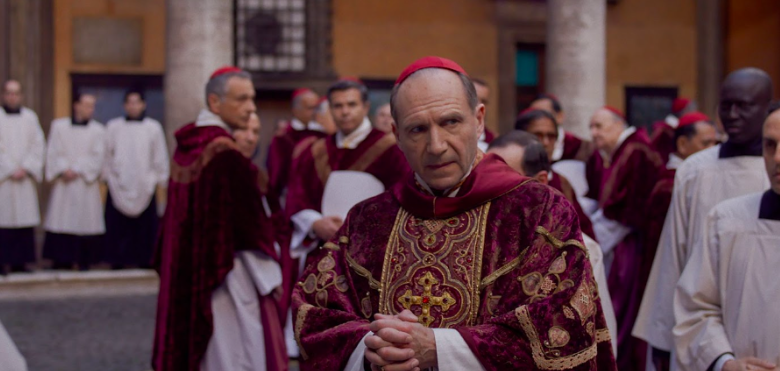
Casey Medeiros ’25 / Emertainment Monthly Staff Writer
“Is this what we’re reduced to, voting for the least-worst option?”. It’s a question ripped straight from the current American political climate, but it’s also surprisingly a line from Edward Berger’s new film Conclave, an entertainingly tense political thriller about the power struggles and backroom dealings during the election of a new Pope.
Based on the 2016 novel by Robert Harris, Berger’s adaptation comes two years after his acclaimed All Quiet on the Western Front adaptation, which was nominated for 9 Academy Awards and won four, including one for Berger himself for Best International Feature. This film, his first English-language film, boasts a wildly impressive cast — Ralph Fiennes, Stanley Tucci, John Lithgow, and Isabella Rosellini, as well as some really interesting lesser-known actors. Coming off of the awards success for Berger’s previous film, and having premiered to acclaim at the Telluride Film Festival, it seems likely that Conclave will be a player this Oscar season. On top of that, the film is also just one of the most enjoyable and precisely-crafted films of the year.
The film begins shortly after the unexpected death of the Pope and follows a group of cardinals from around the globe who are tasked with finding a successor. Gathering in the Sistine Chapel and being placed into sequester, political campaigning and maneuvering unfold as the different factions try to gain power. On one side, there is Cardinal Bellini (Stanley Tucci), the frontrunner for the liberal group. On the more conservative side, there is Cardinal Tedesco (Sergio Castellitto), as well as Cardinal Trembley (John Lithgow) and Cardinal Adeyimi (Lucian Msamati), who would be the first Black Pope if selected. Cardinal Lawrence, who is played by the incredible Ralph Fiennes, leads the process and struggles with his own crisis of faith and his questioning of his purpose. As he oversees the conclave and uncovers secrets, he struggles with his sense of duty and his conscience. The story and the subject matter could seemingly be the basis for an intensely serious film, but with a surprisingly pulpy and melodramatic approach, the result is a film that is both gripping and intelligent at the same time.
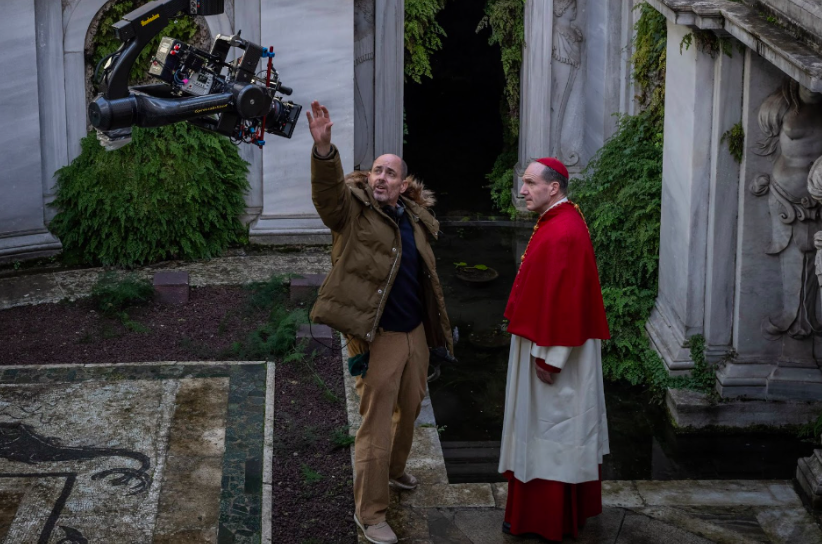
Beyond just being a fun watch, it’s massively impressive what Berger was able to do with this film. Not only does he manage to make a tense thriller with only a PG rating (it is following Catholic cardinals in the Vatican after all), but Berger manages to make a suspenseful and edge-of-your-seat experience out of a process movie about the Papal elections. Some of this praise deserves to go to the source material and acclaimed screenwriter Peter Straughan’s script, but Berger’s filmmaking is masterful here. The visuals are absolutely stunning, and he and cinematographer Stéphane Fontaine somehow pull off making this contained film feel cinematic. Aided by incredible costume and production design, the cinematography is striking and some of the best of the year. Every filmmaking choice feels meticulously designed: from the precise and sometimes abrupt editing to the frequently moving camera, the beautiful framing and shot composition, and the melodramatically flashy but effective score. Berger utilizes everything at his disposal to tell this story as effectively and tensely as possible. He takes what on paper sound like boring and mundane details of the ceremonies – such as the casting and reading of the votes in each round – and turns them into tense and intriguing moments. Berger is in complete control of the medium here, and it’s incredibly satisfying to see play out.
Ralph Fiennes, one of the best actors alive, is the clear standout in the lead role and makes the most of some great material. His performance is relatively internal, and he does such a good job of quietly conveying his character’s dilemmas and inner turmoil, as well as capturing a real sense of sadness and doubt in his eyes. That is not to say he doesn’t deliver some great dialogue though, as his character gives a fantastic speech and Fiennes really shines when asked to do more explosive and emotional scenes.
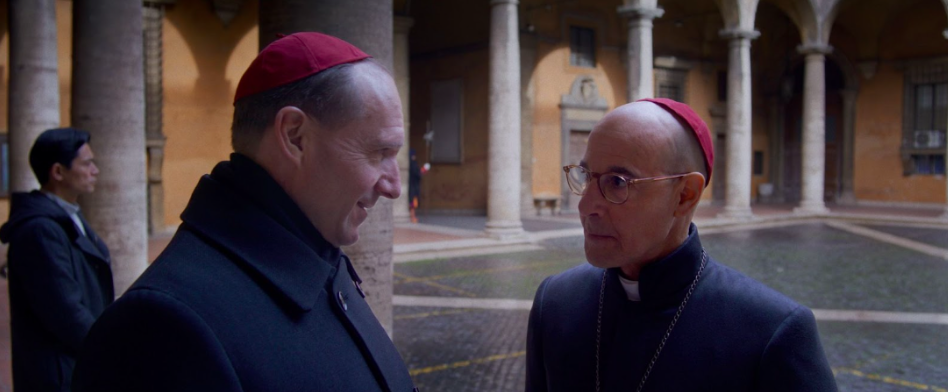
As for the supporting performances, Stanley Tucci’s performance is the biggest as the progressive Cardinal Bellini, but he finds a good balance between knowing when to go big and when not to. His performance also creates a good contrast with the quieter and more subtle performances. John Lithgow and Sergio Castellitto are both good as the oppositional conservative candidates for the papacy, but outside of being cunning they unfortunately aren’t given all that much to work with. Conversely, despite not having the biggest role, Lucian Msamati stands out and is given some really emotional material as another challenger for the papacy. So does Isabella Rossellini as Sister Agnes, where similar to the treatment of nuns in the Church, her role is much smaller than it should be. But despite not having that much screen time or dialogue, Rossellini’s presence as an actress makes her role feel much bigger than it actually is. Then, in his first major film role, Carlos Diehz is great as Cardinal Benitez, a cardinal from Kabul who was secretly appointed by the Pope and whose existence comes as a surprise to the conclave. Diehz does a great job portraying the character’s quiet and mysterious demeanor, as well as his assured idealism and morality.
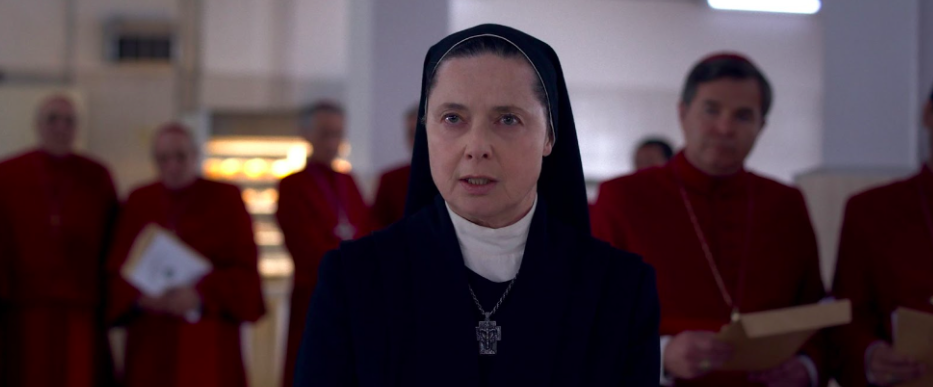
In addition to the filmmaking and the performances, the story and the thematic questions and parallels to our political reality are really fascinating. Virtually nobody knows what goes on during the process of the papal election, but the imagining of it here is really interesting and not subtle at all about trying to remind you of the current political climate. The film portrays the papal election in recognizable ways: the liberals consolidating candidates to have a better chance, the idea of “voting for the lesser of two evils”, the clash between idealism and pragmatism, not being able to find a perfect candidate with broad appeal, worrying about optics, having to navigate potential scandals and corruption, etc. There is the liberal group, who wish to make progress on women’s rights and gay rights, and there is the conservative group, who believe there must be an Italian pope and wish to undo progress and take the church back to what it once was. It’s impossible not to think of our current political context, especially with wonderfully unsubtle lines like “I’d be the Richard Nixon of popes” and “I feel like I’m at some American Political Convention”. There are also many moments and lines that continuously help to remind the audience of the political stakes of the papal election, such as there being “one and a quarter billion souls watching” and talking about selecting “the most famous man in the world”.
Coming out close to the presidential election, a film using the selection of the Pope to parallel the American political system seems bound to upset certain people and be considered controversial, and expectedly, it already has. As it is an adaptation of a book, some conservatives and religious groups have called the film “blasphemous” and “anti-catholic”. This backlash is over the film’s general portrayal of the Catholic Church, but more specifically over the ending, which is a potentially divisive swing that isn’t going to sit well with certain conservative religious groups. However, while the ending probably could have used some better set-up earlier in the film to have a more satisfying pay-off, it ultimately did work and was a really interesting and thematically rich conclusion to the ideas raised in the film. While it seems designed to be provocative, it’s a shame that the ending will probably cause backlash and become a talking point that takes the attention away from the rest of the movie, especially considering how inoffensive the ideas behind the ending should be.
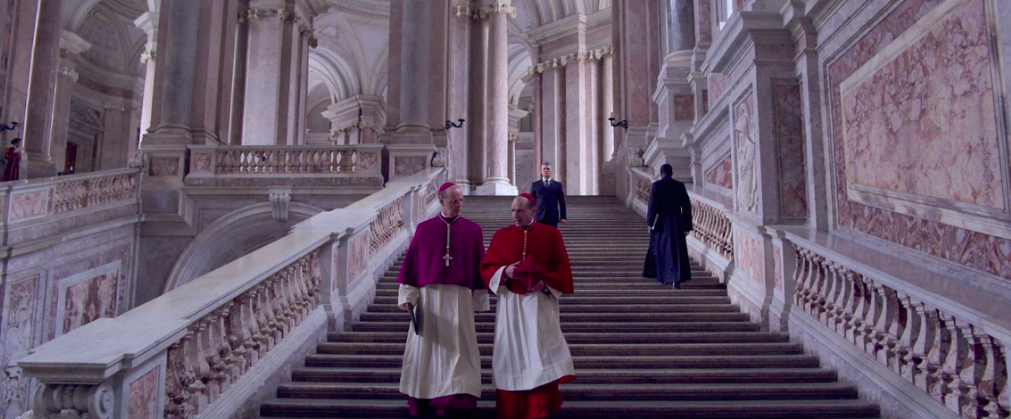
While by no means a groundbreaking or perfect movie, Conclave is a stylish, engaging, and smart political thriller that will deservedly be in the awards conversation and cause a lot of conversation. It features some of the best filmmaking of the year, as well as some of the best performances of the year, all in support of a story that strikes a near-perfect balance between being entertaining and being thoughtful. This is the kind of mature and intelligent mid-budget story that has been relegated to prestige TV lately, and it’s refreshing to see this kind of story back on the big screen.